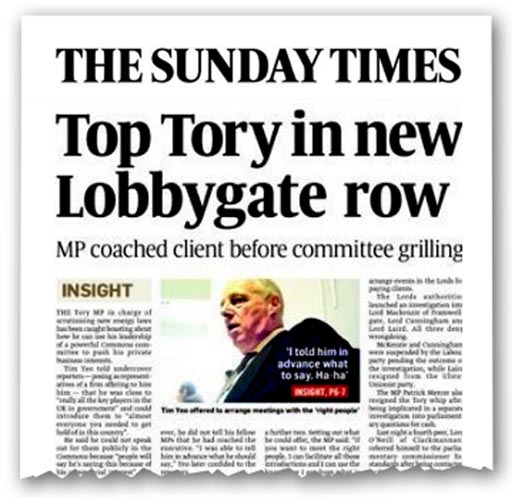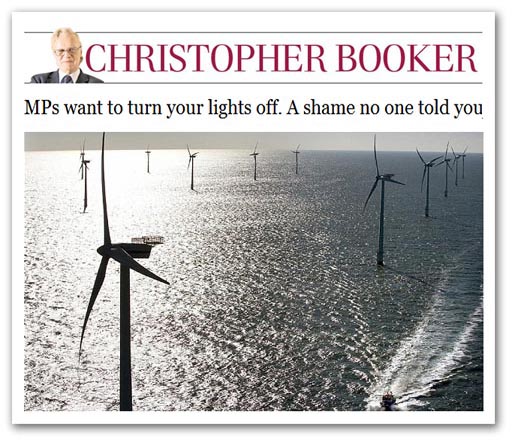Climate change: the trougher trapped?
Sunday 9 June 2013
Tim Yeo, a man already under fire, told undercover reporters — posing as representatives of a firm offering to hire him — that he was close to "really all the key players in the UK in government" and could introduce them to "almost everyone you needed to get hold of in this country". Smashing through the paywall, the Daily Mail gives in-depth treatment to the story, while the BBCalso airs some of the incriminating video – and what a truly repulsive individual Yeo shows himself to be. He was filmed revealing how he had advised John Smith, managing director of GB Railfreight, before the executive gave evidence to the committee last month. Yeo is a paid director and shareholder of Eurotunnel — the firm's parent company. Yeo publicly excused himself from asking questions because of the conflict of interest. However, he did not tell his fellow MPs that he had coached the executive. "I was able to tell him in advance what he should say", Yeo confided to the reporters. The former environment minister has earned about £530,000 from private firms since taking over the committee in 2010, and has shares and options worth about £585,000 in "low-carbon" companies that have employed him. Yeo, while denying allegations (all of the) has referred himself to the Parliamentary standards commissioner, and an investigation will follow. One hopes then that some light will be shed on the murky world of parliamentary select committees, where it is all to easy (and common) to rig the evidence to achieve a desired result. Apart from anything else, MPs really need to take a hard look at select committee chairmen - who get paid an extra £20,000 a year for their efforts – and whether they should be permitted to take fees from external interests where there is clearly potential for conflict of interest. At the very least, Yeo demonstrates quite how easy it is to circumvent the spirit of the rules. He toldSunday Tines journalists that he could not speak out for clients publicly in the Commons because "people will say he's saying this because of his commercial interest". But he assured them: "What I say to people in private is another matter altogether". The journalists had approached Yeo posing as representatives of a solar energy company offering to hire him as a paid advocate to push for new laws to boost its business for a fee of £7,000 a day. He told them he could commit to at least one day a month, despite the fact that he already held four private jobs and was in negotiations to take a further two. Setting out what he could offer, the MP said: "If you want to meet the right people, I can facilitate all those introductions and I can use the knowledge I get from what is quite an active network of connections". Asked if that extended to government figures, Yeo replied: "Yes". The House of Commons code of conduct forbids members from acting as paid advocates, including by lobbying ministers. Those who know how politics works are conscious that access to people in power is half the battle. It is for access to the private (some might say secret) network of influence for which commercial companies are prepared to pay real money. And it is that in which Yeo is trading, to his own considerable profit. Arguably, the whole select committee system needs to be cleaned out – including removing ex-ministers from chairmanships – their own roles often being to block investigations into matters for which they have been previously held responsibility. If parliament is to carry out even a halfway effective scrutiny role, the select committees themselves must be above reproach, and they must be accessible to all when it comes to presenting evidence and having it heard. As long as there a people such as "trougher" Yeo around, that clearly is not the case. COMMENT THREAD Richard North 09/06/2013 |
Booker: delivering EDR
Sunday 9 June 2013
Unfortunately, Booker's story is based on the premise that the Government introduced and Parliament approved an amendment (spool to the end) requiring the Secretary of State to publish a strategy setting out policies to achieve a reduction in demand for electricity of at least 103 TWh by 2020 and 154 TWh by 2030.
That, as Booker writes, is something so utterly mad that, if anyone present had understood its implications, it might have made front-page news. We currently use each year some 378 "terawatt hours". So what was being proposed was that this must be cut down in six years by 27 percent – more than a quarter – rising 10 years later to a cut of more than 40 percent, or two fifths. What we didn't realise what that this was not a government amendment. The way it is "bundled" in the Hansard record does not make this clear. In fact, it was tabled by the utterly mad Green MP Caroline Lucas. And, although there is no confirmation of this in the official record, the amendment seems to have been withdrawn prior to a division (Column 1469). Nevertheless, energy minister Greg Barker agreed with the amendment "in principle", while secretary of state Ed Davey is clearly committed to achieving the objectives to which the Lucas amendment was addressed. However, the substantive detail in the story is wrong and for that we apologise. Booker will publish a correction next week. COMMENT THREAD Richard North 09/06/2013 |























